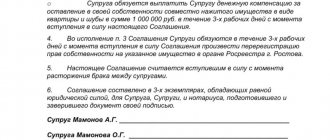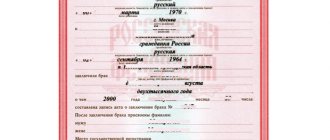Division by agreement of the parties
Owners of common shared property can enter into an agreement on its division at any time. It specifies the method and conditions for dividing common property, and the share due to each owner (Article 252 of the Civil Code of the Russian Federation).
If this is permitted by law, the owner of a share in the property may demand its allocation in kind (i.e., the transfer of independent property to him) forcibly. It is necessary that the share can be technically allocated without damaging the disputed property. For example, it is impossible to divide a car in kind, it is not always possible to allocate a share in a residential property, etc.
Expert opinion
Lawyer Alexander Vasiliev comments
The possibility of allocating a share in an apartment is ambiguously assessed by the courts. An apartment is recognized as divisible only if it has two independent entrances, and at the same time it is possible to allocate to each co-owner not only separate residential premises, but also utility rooms - kitchen, bathroom, toilet (Appeal ruling of the Chelyabinsk Regional Court dated August 30, 2013 in case No. 11-9001 /2013).
Instead of receiving things in kind, the owner of a share has the right to claim compensation from another owner (owners) in the amount of the value of his share (Article 252 of the Civil Code of the Russian Federation). If there is no agreement between the owners, the issue of division of property may be considered by the court.
Division of marital property
All property acquired by each spouse during the marriage, as a general rule, is in the common joint property of the spouses. In this case, it does not matter in whose name the property was registered, the deposit was opened, etc. (Resolution of the Plenum of the Supreme Court of the Russian Federation of November 5, 1998 No. 15 “On the application of legislation by courts when considering divorce cases”).
If desired, spouses can divide jointly acquired property under an agreement on its division or in accordance with a marriage contract, and in case of a dispute, seek a decision in court.
- Spouses can enter into an agreement on the division of property during the marriage or after its dissolution. This agreement establishes the legal regime of property that has already been acquired by the spouses.
- A marriage contract can be concluded before registering a marriage or during the marriage (Article 41 of the Family Code of the Russian Federation). It can establish the rights of spouses in relation to both existing property and those that will only be acquired. It is important that a marriage contract can only regulate material and financial issues of the spouses (expenses for maintaining the family, division of jointly acquired property in the event of divorce, etc.), but cannot regulate moral ones (such as raising children).
Both the agreement on the division of property of the spouses and the marriage contract must be notarized (clause 2 of article 38 of the Family Code of the Russian Federation). The costs are:
- The notary fee for private notaries and the state fee paid when applying to a state notary is 500 rubles. This is the rate of the state duty (tariff) for certifying a transaction, the subject of which is not subject to assessment;
- legal and technical services of a notary for the preparation of documents are paid separately (clause 6, clause 1, article 333.24 of the Tax Code of the Russian Federation, article 22 of the Fundamentals of the legislation of the Russian Federation on notaries).
The fee for technical services of a notary for certification of marriage contracts and agreements on the division of property of spouses should not exceed the maximum amount that is annually established by the Federal Notary Chamber for each region (located at https://www.notariat.ru/ru-ru/actions- and-tariffs/tarify-na-uslugi-pravovogo-i-tehnicheskogo-haraktera/).
The maximum cost of a notary's technical services when certifying marriage contracts and agreements on the division of property of spouses in most regions is 10 - 15 thousand rubles. However, in some regions the fee is higher.
For example, in 2020, the fee for technical services when certifying a marriage contract should not exceed:
- 16,317.72 rubles in Moscow;
- 10,731.51 rubles in St. Petersburg;
- 12,853.98 rubles in the Belgorod region;
- 28,981.81 rubles in the Murmansk region;
- 16,022.37 rubles in Novosibirsk;
- 32,872.32 rubles in Magadan.
Technical work when certifying an agreement on the division of property of spouses in 2020 will cost:
- 12,552.09 rubles in Moscow;
- 8,255.02 rubles in St. Petersburg;
- 9,887.68 rubles in the Belgorod region;
- 22,293.70 rubles in the Murmansk region;
- 12,324.90 rubles in Novosibirsk;
- 25,286.40 rubles in Magadan.
The state fee (notary fee) is paid directly to the notary in cash or by bank transfer.
Property valuation is not carried out when concluding a marriage contract or an agreement between spouses on the division of property. However, in the event of a division of property during a divorce, either spouse may require an appraisal if they have not agreed on the value (Article 8 of the Federal Law “On Valuation Activities in the Russian Federation” dated July 29, 1998 No. 135-FZ).
In the concluded agreement, the parties can provide each party with a share in an apartment, house, or land. Or, the parties can divide the objects as a whole - an apartment for one spouse, a dacha for the other, a car, etc.
Spouses can divide the cost of paying the state fee (notary fee) at their own discretion - in half or in other shares.
Expert opinion
Lawyer Alexander Vasiliev comments
According to the Russian Ministry of Finance (Letter dated March 2, 2020 No. 03-04-07/11811):
- Personal income tax is not paid on the amount of compensation paid by the spouse who received a larger share to the spouse who received a smaller share, based on a court decision (Article 217 of the Tax Code;
- Personal income tax is not paid when dividing property between spouses during marriage, since the spouses do not have economic benefits subject to taxation;
- Personal income tax is paid on the amount of similar compensation paid by the former spouse after the divorce.
Allocation of shares after the death of one of the spouses
In the event of the death of one of the spouses, the surviving spouse has the right to formalize his share in the common property out of court by contacting a notary in charge of the inheritance case. The notary fee (paid when applying to a private notary) or state duty (paid to a state notary) is 200 rubles (clause 11, clause 1, article 22.1 of the Fundamentals of the legislation of the Russian Federation on notaries). The specified tariff includes the issuance of a certificate of ownership of the allocated share of property.
How to prove that the apartment was purchased with parents’ money?
Nowadays, it is very difficult for newlyweds to independently acquire their own housing. And parents often come to the rescue by purchasing real estate with their own funds. This is all great until the couple gets divorced.
It is very difficult to prove that the apartment is not jointly acquired property, but was acquired by the parents of one of the spouses. As judicial practice shows, when considering such cases, the court does not have enough explanations from the spouse and his parents, since they are interested parties. And without compelling reasons, the property will be recognized as jointly acquired.
In order for the court to recognize an apartment purchased with parents’ money as personal property, it is necessary:
- The transfer of funds should be formalized by a gift agreement or a receipt. A win-win option is a gift agreement. It is better to have everything notarized so that the court has no doubt about the authenticity of the document;
- The contract or receipt should indicate that the money is being transferred specifically for the purchase of an apartment; it is advisable to indicate the location address.
In court, it is necessary to prove the fact that the parents transferred money to their child, and not to the family. For example, they sold an apartment and put the proceeds in the bank. Then they transferred them to the child’s account, and the latter paid for a new apartment with them in the coming days. Here, the evidence will be: an agreement confirming the sale of the apartment by the parents, statements from their account and the child’s account, as well as an agreement on the purchase of the apartment by one of the spouses. But you will also need to provide documents confirming that the parents did not have any major transactions during this period, and also that the couple did not have joint money to purchase real estate.
You can also use as evidence witness testimony, for example, a realtor who handled the transaction or a citizen from whom the disputed housing was purchased.
In general, it is difficult to prove that the apartment was bought with the parents’ money, but it is possible. And, of course, you can’t do this without the help of an experienced lawyer.
Division of property in court
Cases on division of property, allocation of a share from common property, as well as recognition of the right to a share in common property are considered by courts of general jurisdiction. The state duty is paid according to the rules of paragraphs. 3 p. 1 art. 333.20 of the Tax Code:
- if the dispute regarding the recognition of the plaintiff’s ownership of this property has not previously been resolved by the court, the state duty is paid as for property claims in the amounts established by paragraphs. 1 clause 1 art. 333.19 of the Tax Code (depending on the value of the property that is the subject of the dispute): up to 20,000 rubles - 4% of the claim price, but not less than 400 rubles;
- from 20,001 rubles to 100,000 rubles - 800 rubles plus 3% of the amount exceeding 20,000 rubles;
- from 100,001 rubles to 200,000 rubles - 3,200 rubles plus 2% of the amount exceeding 100,000 rubles;
- from 200,001 rubles to 1,000,000 rubles - 5,200 rubles plus 1% of the amount exceeding 200,000 rubles;
- over 1,000,000 rubles - 13,200 rubles plus 0.5 percent of the amount exceeding 1,000,000 rubles, but not more than 60,000 rubles (the maximum amount of state duty for considering a dispute on the division of property in court).
- 300 rubles for individuals;
If the value of the property (for example, the amount of funds on bank deposits) is unknown, it is difficult to determine the state duty. In this case, the plaintiff indicates in the statement of claim the amount or price of the property known to him, and pays the state duty based on the available data. The judge, by his ruling, must establish the preliminary price of the claim and the preliminary state duty. Subsequently, when resolving the case, the state fee will need to be paid within 10 days from the date the court decision enters into force (clause 9, clause 1, article 333.20 of the Tax Code of the Russian Federation).
The state fee must be paid by the spouse who went to court.
Payment of the state fee is made according to the details of the court competent to consider the case. The case is heard by the court at the place of residence of the defendant spouse. If the value of the claim is up to 50,000 rubles, the case is considered by a magistrate, and above that by a district court of general jurisdiction (clause 3, part 1, article 23, article 24 of the Civil Procedure Code of the Russian Federation).
After the completion of the consideration of the case, the state duty is collected from the defendant who lost the case in proportion to the requirements satisfied. If the claim was denied, the costs of paying the state duty to the plaintiff will not be reimbursed.
When dividing property, shares are assumed to be equal by default (however, the court may establish a different proportion, depending on the contribution of each spouse). Each spouse may have a share in any movable or immovable property (apartment, house, land plot).
Or, the court may, at the request of one of the spouses, reserve any property for him, subject to payment to the second spouse of equivalent compensation (in cash or in the form of other property).
Property acquired by each spouse during the period of separation may be recognized as belonging to each spouse separately. Bank deposits made in the name of children are considered to belong to the children and are not divided between the spouses. Children's things are transferred to the spouse with whom the children live.
Who will pay legal costs
According to Article 98 of the Code of Civil Procedure of the Russian Federation, the losing party in the case must reimburse all expenses incurred by the second party. The exception is cases when the court, on its own initiative, ordered an examination, called witnesses and experts to the court (these expenses are paid from the budget of the appropriate level).
Costs are paid in proportion to the portion awarded. For example, if the claim is satisfied in full, the defendant reimburses all expenses; if in parts, then the state duty and other expenses are divided into shares.
As for pre-trial expenses, for example, for paying for the services of an expert in assessing property, they are borne by the party that was interested in this.
Section of debts and loans
Expert opinion
Lawyer Alexander Vasiliev comments
The division of debts by agreement in favor of only one of the spouses is permitted by law (Decision of the Supreme Court of the Russian Federation dated September 24, 2013 No. 69-KG13-3). However, such an agreement will not save you from having to repay the loan. In accordance with Art. 46 of the Family Code of the Russian Federation, such an agreement binds only spouses, while the deterioration of the property status of the debtor spouse as a result of the execution of such an agreement does not entail legal consequences for the creditors of the debtor who did not participate in it (clause 3 of Article 308 of the Civil Code of the Russian Federation). If the purpose of concluding an agreement out of court or in court was to hide property from creditors through a fictitious division, the property may be foreclosed on (Definition of the Judicial Collegium for Economic Disputes of the Supreme Court of the Russian Federation dated September 24, 2018 No. 304-ES18-4364 in case No. A03- 7118/2016).
Loans and other debts of the spouses are distributed by agreement of the parties, and in the event of a legal dispute - in proportion to the shares in joint property awarded to the spouses (Article 39 of the Family Code of the Russian Federation).
According to paragraph 2 of Art. 45 of the Family Code of the Russian Federation, the penalty is applied to the common property of the spouses for common obligations, as well as for the sole obligations of one of the spouses, if the court establishes that the funds received were used for the needs of the family. In this case, the second spouse may also become obligated on the loan (Review of judicial practice of the Supreme Court of the Russian Federation No. 1 (2016), approved by the Presidium of the Supreme Court of the Russian Federation on April 13, 2020).
This article contains general information about legal regulations. Consult an attorney for legal advice regarding your specific issue.
Is it possible to challenge a court verdict?
One of the spouses or another person whose rights were violated by a judicial act has the right to prepare an appeal and challenge the position of the original court.
In the court of second instance, the applicant will have another attempt to resolve the dispute, although slightly limited in rights.
The next court may agree with the decision, change it in part, cancel it completely and resolve the case differently. The decisions of such a court come into force immediately after the operative part is announced in the courtroom.
How long does it take to file a complaint?
Within a month, the complaint is filed with the court office or sent by mail . If the deadline is missed for valid reasons, be sure to include a petition to restore the deadline for appeal, along with supporting written evidence.
Registration of rights to real estate after its division
Some particularly valuable property (real estate, cars, etc.) require registration of ownership. If a division agreement is concluded, or a court decision is made in relation to such property, the owner who received it must complete the registration of his rights. To do this you need to contact:
- to the traffic police for vehicle registration;
- to Rosreestr (Office of the Federal Service for State Registration, Cadastre and Cartography) when registering an apartment, house, dacha and other real estate.
For registration of property rights, a state fee is charged in the amount established by the Tax Code of the Russian Federation for the corresponding action.
The information provided in this article is of a general nature. Contact a lawyer to resolve your specific issue.








